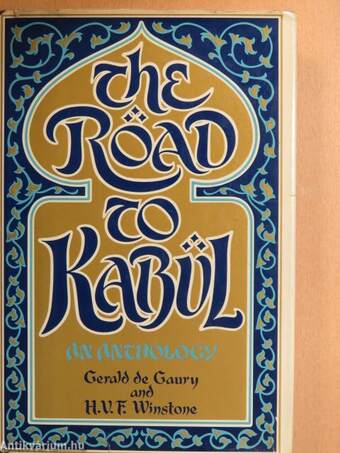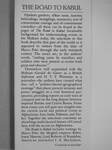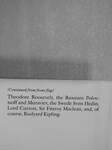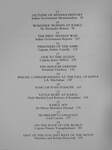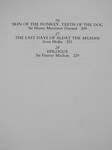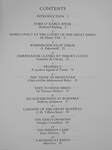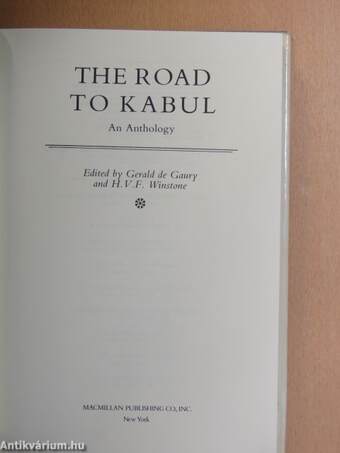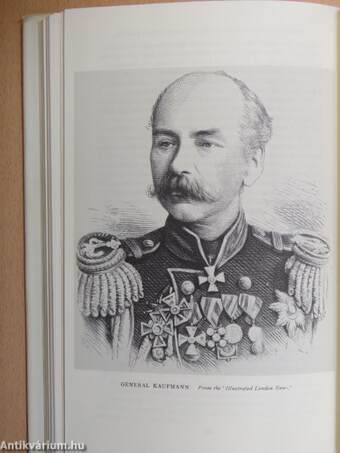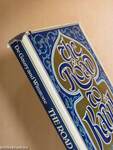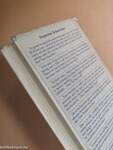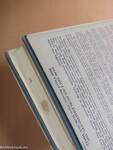1.067.255
kiadvánnyal nyújtjuk Magyarország legnagyobb antikvár könyv-kínálatát

VISSZA
A TETEJÉRE
JAVASLATOKÉszre-
vételek
The road to Kabul
An Anthology
| Kiadó: | Macmillan Publishing Co., Inc. |
|---|---|
| Kiadás helye: | New York |
| Kiadás éve: | |
| Kötés típusa: | Félvászon |
| Oldalszám: | 233 oldal |
| Sorozatcím: | |
| Kötetszám: | |
| Nyelv: | Angol |
| Méret: | 24 cm x 16 cm |
| ISBN: | 0-02-542940-X |
| Megjegyzés: | Néhány fekete-fehér illusztrációval. További kapcsolódó személyek a könyvben. |
naponta értesítjük a beérkező friss
kiadványokról
naponta értesítjük a beérkező friss
kiadványokról
Fülszöveg
THE ROAD TO KABUL
Opulent gardens, silken tents, harems; beheadings, stranglings, massacres; acts of consummate courage and of consummate cowardice—all these can be found in the pages of The Road to Kabul. Invaluable background for understanding events in the Mideast today, the selections in this book describe that part of the world as it appeared to visitors from the time of Marco Polo through the early twentieth century. The essays are, in the authors' words, "rattling yarns by travellers and soldiers who were present at events both great and obscure."
Themselves well acquainted with the Mideast—Gerald de Gaury as a British diplomat and H. V. F. Winstone as a journalist—the authors have created what they call a "politico-literary-geographical montage" that places present tensions and power struggles in a vital historical perspective, providing reports on early wars of conquest and on the long dispute between imperial Britain and Czarist Russia. From these essays you will gain... Tovább
Fülszöveg
THE ROAD TO KABUL
Opulent gardens, silken tents, harems; beheadings, stranglings, massacres; acts of consummate courage and of consummate cowardice—all these can be found in the pages of The Road to Kabul. Invaluable background for understanding events in the Mideast today, the selections in this book describe that part of the world as it appeared to visitors from the time of Marco Polo through the early twentieth century. The essays are, in the authors' words, "rattling yarns by travellers and soldiers who were present at events both great and obscure."
Themselves well acquainted with the Mideast—Gerald de Gaury as a British diplomat and H. V. F. Winstone as a journalist—the authors have created what they call a "politico-literary-geographical montage" that places present tensions and power struggles in a vital historical perspective, providing reports on early wars of conquest and on the long dispute between imperial Britain and Czarist Russia. From these essays you will gain new insights into the current social and political events in Afghanistan, Iran, India, Pakistan, and Turkey. Together the selections constitute an absorbing, multi-faceted history of Central Asia, with the accent on Afghanistan.
The Road to Kabul includes writings by Marco Polo, the Moghul emperor Baber, Jonas Hanway, Lord Roberts of Kandahar, American journalist J. A. MacGahan, (Continued on back flap)
(Continuedfrom front flap)
Theodore Roosevelt, the Russians Polov-tsoff and Muraviev, the Swede Sven Hedin, Lord Curzon, Sir Fitzroy Maclean, and, of course, Rudyard Kipling. Vissza
Témakörök
- Idegennyelv > Idegennyelvű könyvek > Angol > Szépirodalom > Antológia
- Idegennyelv > Idegennyelvű könyvek > Angol > Szépirodalom > Regény, novella, elbeszélés
- Idegennyelv > Idegennyelvű könyvek > Angol > Útleírás
- Útleírás > Idegennyelvű útleírás > Angol
- Útleírás > Kontinensek > Ázsia > Közel-Kelet
- Szépirodalom > Regény, novella, elbeszélés > Tartalom szerint > Arab világ
- Szépirodalom > Regény, novella, elbeszélés > Tartalom szerint > Földrajzi besorolások > Ázsia
- Szépirodalom > Regény, novella, elbeszélés > Tartalom szerint > Összegyűjtött elbeszélések
- Szépirodalom > Regény, novella, elbeszélés > Tartalom szerint > Útikalandok, útirajzok
- Szépirodalom > Antológia



